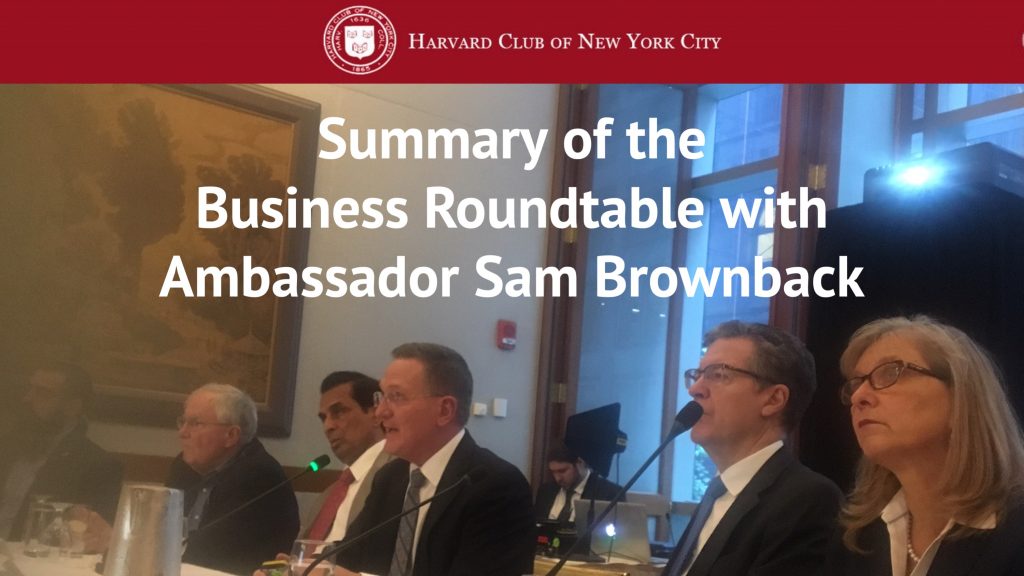- Wednesday, September 25, 2019
- Harvard Club of New York City
A direct result of RFBF’s groundbreaking work on religious freedom and business was the Sept. 23rd call at the start of the 2019 United Nations General Assembly for a coalition of businesses to protect religious freedom. Two days after this call, RFBF cohosted the first international religious freedom coalition business roundtable together with US Ambassador at Large for International Religious Freedom Sam Brownback and Mr. Bruce McEver, Founder and Chairman of Berkshire Global Advisors.
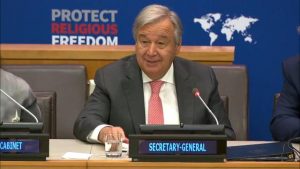
The event featured a discussion on the relationship between religious freedom and economic prosperity with Ambassador Brownback and State Department Chief Economist Sharon Brown-Hruska, who sat down with business leaders, government officials and civil society representatives to discuss ways to incentivize countries to ease restrictions on religious freedom in hopes to realize their economic aspirations. This event was open to the press.
- 1. Presentation by Dr. Brian J. Grim
- 2. Presentation by Dr. Sharon Brown Hruska
- 3. Opening Words by Ambassador Brownback
- 4. Suggestions from Business Leaders and heads of NGOs
I. Presentation by Dr. Brian J. Grim
Bruce McEver, founder and chairman of Berkshire Global Advisors and co-founder and president of The Foundation for Religious Literacy offered words of welcome, after which Dr. Brian J. Grim, president of the Religious Freedom & Business Foundation, offered a scholarly presentation. His research showed that countries with decreasing restrictions on religious freedom had the best economic growth and vice versa; on how religious liberty is linked to economic growth; and how countries with higher religious freedom have higher support for LGBT rights.
Grim invited all to the Global Business & Interfaith Peace Awards event in Tokyo August 23-25, 2020, where we will hold the first annual International Business Roundtable on Protecting People of all Faiths and Beliefs in the Workplace in response to President Trump’s call.
II. Presentation by Dr. Sharon Brown Hruska
The Chief Economist for the U.S. Department of State, Dr. Sharon Brown-Hruska, gave a prepared speech about the correlation of economic prosperity and religious freedom rights.
The State Department’s Chief Economist Dr. Sharon Brown-Hruska introduced her comments to the Roundtable by noting that her belief in free and open markets to facilitate price discovery and send signals to balance supply and demand is akin to her belief that “our basic freedoms, including religious freedom, play critical roles in generating economic prosperity.” She added, “As an economist, I understand correlation and causality are not the same. The empirical relationship between economic growth and religious freedom is an area worthy of further study.”
Dr. Brown-Hruska cited Theodore Roosevelt Malloch, who conducted a survey of a hundred countries and territories that found that religious freedom correlates strongly and significantly with Freedom House’s civil and political liberties indices, ‘Reporters Without Borders’ press freedom index, and the Heritage/WSJ scale of freedom from corruption index. Brown-Hruska noted that, “from an economics perspective, Mallock found that the level of earned income for women, measured in purchasing power parity dollars, goes down 57% as government restrictions on religious freedom go up, along with a 54% decline for men. Further, countries that restrict religious freedom tend to have poor economic records over a number of measures. For example, religious restrictions are also vary inversely with economic development metrics including having 25% fewer physicians, a 43% higher infant mortality, and a 29% higher percentage of underweight children. In sum, countries with higher levels of freedom have correspondingly higher measures of economic development.”
She also noted that studies by Brian Grim (2015 and 2008, Pew Research Center 2014b) confirm that countries with higher religious freedom offer better economic well-being to their citizens. Dr. Christos Makridis, who is joining the State Department from the Counsel of Economic Advisors, compiled a dataset of 150 countries spanning 2006-2018. Christos found that “while there are significant cross-country differences in religious liberty, it has declined considerably across countries, particularly among more developed countries. He also finds that increases in religious freedom are associated with robust and causal increases in economic measures of human flourishing. Brown-Hruska noted that, “These results suggest that religious liberty does have causal effects when one constructs and evaluates measures of economic development and welfare, confirming Brian Grim’s work, among others.”
III. Opening Words by Ambassador Brownback
Ambassador Sam Brownback, the U.S. Ambassador at Large for International Religious Freedom, offered informal, brief opening words. He reflected upon his time in the U.S. Senate when the primary mechanism for promoting religious freedom abroad was “finger wagging.” He explained that approach was not always effective and that, now that he’s in this new role, he was looking for alternative strategies. He opened the floor to solicit suggestions from business leaders.
IV. Suggestions from Business Leaders
Leaders offered the following suggestions:
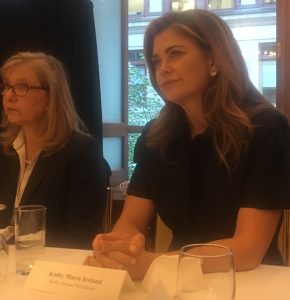 CEOs have a critical role in setting a tone in the entire company. This includes, making it explicit that the business must support a robust holiday schedule, ensuring that global companies respect and uplift culture-specific contexts, regardless of the religions practiced in those regions. This approach is good for employee morale, good for customer relations, and good for economic returns.
CEOs have a critical role in setting a tone in the entire company. This includes, making it explicit that the business must support a robust holiday schedule, ensuring that global companies respect and uplift culture-specific contexts, regardless of the religions practiced in those regions. This approach is good for employee morale, good for customer relations, and good for economic returns.
Another leader suggested that the Golden Rule should be at the heart of all business decisions, aware that it’s a value affirmed by many of the world’s religions.
Recommendation to use the “non-flick” method for interfaith engagement in businesses. This begins by identifying what religions have in common based on the leadership competency of understanding self and other. The purpose is to ensure that everyone is respected and safe to be themselves. The next step is to understand one another’s perceptions of realities/contexts that we deal with on a daily basis, then visualizing our ideal shared reality, bringing out best in another and working to promote freedom, security, and prosperity for everyone.
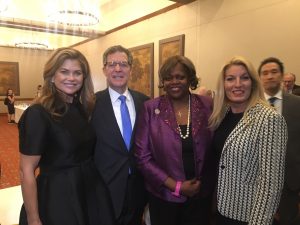 The former U.S. Ambassador for International Religious Freedom (Suzan Johnson Cook) spoke of the organization, Women on the World Stage, for the purpose of multicultural peace building. Told a story of how employees cover for one another during various holidays, aware of how important it is for one another’s colleagues to practice their customs/culture. She gave an example of interfaith partnerships in New York City, where religious leaders from a variety of traditions not just know one another professionally and share one another’s pulpits and attend one another’s social events, but they learn together and they know one another’s families and are invested in one another’s personal lives.
The former U.S. Ambassador for International Religious Freedom (Suzan Johnson Cook) spoke of the organization, Women on the World Stage, for the purpose of multicultural peace building. Told a story of how employees cover for one another during various holidays, aware of how important it is for one another’s colleagues to practice their customs/culture. She gave an example of interfaith partnerships in New York City, where religious leaders from a variety of traditions not just know one another professionally and share one another’s pulpits and attend one another’s social events, but they learn together and they know one another’s families and are invested in one another’s personal lives.
Another business leader spoke of the importance for her as CEO to conduct surprise site visits in her factors to ensure compliance with humane working conditions. Her company invested hundreds of thousands of dollars on tough human rights clauses in business contracts that would ensure fair and humane workplaces. If broken, business leaders can bring a global spotlight on human rights abuses. We need not shy away from countries where abuse is ramped, but we must respond with moral engagement, forcing compliance to human rights protections and environmental-friendly business choices.
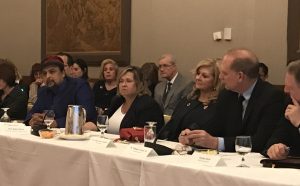 A concern was expressed about how technology can result in human alienation, creating virtual and real distance in humanity. How can businesses help create deeper understanding among people with whom we are working?
A concern was expressed about how technology can result in human alienation, creating virtual and real distance in humanity. How can businesses help create deeper understanding among people with whom we are working?
Another business leader expressed concern about the “heckler’s veto”—when someone is offended when a person mentions Jesus, then all Christians are out. He asserted that everyone can’t be stopped because one heckler doesn’t like it.
A Sufi Muslim leader explained that the Quran speaks of God dividing humans into nation and tribes for the purpose of knowing one another. He said that this includes religious people and those who do not believe in a divine entity. All people are equal. The purpose is to communicate honestly, compassionately, with empathy—all of these virtues are good for business.
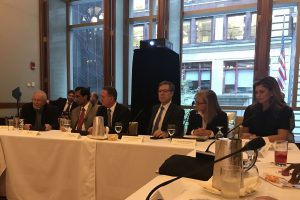 A business leader spoke of the value of her company creating faith-based networks, diversity groups within their global company. Similar to other affinity groups based on race or sexual orientation, they have formed faith-based employee affinity group for Muslims, Jews, Christians. There are not 3,500 members across all chapters in the global company. How has it been received by employees? Overwhelmingly positive. Employees feel they can bring their whole selves to work. This informed me personally, the leader said, resulting in me taking a job with our company over other job offers—I wanted to work for a company that protected and valued the religious identity of its employees, she said. What is the ultimate purpose of these groups? Knowledge cancels out fear. Companies have to have knowledge of how religion plays out in the everyday lives of its employees. This is not without limits. We follow the laws in ensuring that we do not promote religion. There’s no proselytizing — our business is not a church. Also, our company cannot create a religious test for business. We promote equal opportunity. No preference to any one religion or nonreligion. No bible thumping.
A business leader spoke of the value of her company creating faith-based networks, diversity groups within their global company. Similar to other affinity groups based on race or sexual orientation, they have formed faith-based employee affinity group for Muslims, Jews, Christians. There are not 3,500 members across all chapters in the global company. How has it been received by employees? Overwhelmingly positive. Employees feel they can bring their whole selves to work. This informed me personally, the leader said, resulting in me taking a job with our company over other job offers—I wanted to work for a company that protected and valued the religious identity of its employees, she said. What is the ultimate purpose of these groups? Knowledge cancels out fear. Companies have to have knowledge of how religion plays out in the everyday lives of its employees. This is not without limits. We follow the laws in ensuring that we do not promote religion. There’s no proselytizing — our business is not a church. Also, our company cannot create a religious test for business. We promote equal opportunity. No preference to any one religion or nonreligion. No bible thumping.
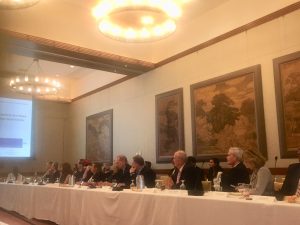 A leader told a story of how an employee donated sixteen cases of Bibles and left them in lunchroom. Rather than forbid it or endorse its distribution, company attorneys let it be an expression of the employees not a company endorsement of any one religion. The Bibles were all taken by employees within an hour, but this distribution did not occur again. It was neither hindered nor privileged. The question for the legal team was how to navigate these legal questions about religion in the workplace.
A leader told a story of how an employee donated sixteen cases of Bibles and left them in lunchroom. Rather than forbid it or endorse its distribution, company attorneys let it be an expression of the employees not a company endorsement of any one religion. The Bibles were all taken by employees within an hour, but this distribution did not occur again. It was neither hindered nor privileged. The question for the legal team was how to navigate these legal questions about religion in the workplace.
At the United Nations Global Compact Network, we seek to understand how religious freedom is not only a legal term, but also a call to another form of freedom: to better understanding the other. The Muslim community, in Indonesia for examples, is the largest population in the country; and yet, that majority choose on its own not to create an Islamic state. Why? Because many religions were involved in creating the country. There is tremendous diversity within Islam and between other religious traditions, with many cultures and ethnicities, with over 300 dialects in the nation. The majority did not seek to force religious uniformity but to protect everyone equally. In Islam, there is a religious basis for being friendly across religions. This is true for businesses, too. Building friendships is the ultimate goal: to work together in a company you build collegial relationships which become lasting friendships with people across traditions that you would not otherwise have in religiously-segregated neighborhoods. Businesses create an encounter with people of different religions. As a result, every holiday is celebrated in businesses in Indonesia—Christmas, Eid, you name it, everyone is involved. There are six government holidays honoring the major holidays of major religions: Buddhist, Christian, Muslim, etc. Companies provide transportation for employees to attend their holiday celebrations. Some attend to learn about one another’s religions. It is not just tolerance of one another but the promotion of good relations between diverse employees.
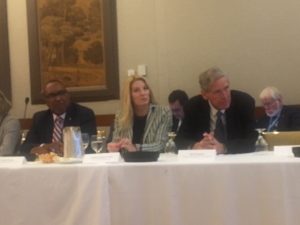 Religions have also helped people with no birth certificates gain documentation. In Indonesia we found that couples who had been together for decades had children together because they were not legally married; as a result, their children were not given birth certificates—there people not recognized as people in their own country. Interfaith groups to help them get these documents by performing mass marriages, where people one Muslim couple got married next to someone who was Hindu, and the other couple next to them was Buddhist. Parents were married: this is how business leaders worked with religious groups to help give kids birth certificates and become documented citizens.
Religions have also helped people with no birth certificates gain documentation. In Indonesia we found that couples who had been together for decades had children together because they were not legally married; as a result, their children were not given birth certificates—there people not recognized as people in their own country. Interfaith groups to help them get these documents by performing mass marriages, where people one Muslim couple got married next to someone who was Hindu, and the other couple next to them was Buddhist. Parents were married: this is how business leaders worked with religious groups to help give kids birth certificates and become documented citizens.
India is the largest democracy and in a few years will be the largest population in the world. A leader expressed that his family is Muslim in a Hindu majority country. The ruling party is currently a nationalistic Hindu party. India’s Constitution allows religious freedom by law but not in practice. In response, business leaders are sponsoring conferences to bring people together. For instance, the International Center for Law and Religion Studies at Brigham Young University is doing a tremendous job studying India’s constitution—using the results to inform the government’s pathways forward. Use these types of organizations help, in a peaceful way, influence leaders in the country. The business leaders and conference leaders are not there to change the politicians or to convert them to a religion but to influence them through education, teach them in a peaceful way.
Unlike Davos, that is only focused on economics, the international Horasis conference includes religious leaders, aware the in order for businesses to thrive there has to be religious freedom in the workplace to promote greater harmony together. Our goal is to demonstrate how to thrive and flourish through peaceful coexistence.
A concern was expressed that political correctness hinders freedom. We need to end political correctness in order to change media. Not to be afraid to bring God, religion, Bible or the Quran to our business meetings.
A discussion was had of the country of Guyana, with its new oil discoveries. Each celebrate one another’s religious holidays. Soon to become the new Kuwait, there are a lot of business opportunities in this oil rich country in South America. A story was shared about how individual religious people who were leaders of companies there negotiated with and worked with two ambassadors and leaders of the Church of Jesus Christ of Latter-day Saints. The purpose was to ensure that the country’s ecclesial leaders were not the only ones represented but that business leaders and people of other religions were included in an otherwise hostile country. The purpose was to invite the business leaders in the country, invite them and solicit their help, to solve government conflicts.
A thought experiment was posed, asking whether the government can incentivize religious freedom in the workplace by creating a tax bracket if they met certain legal guidelines for protecting religious freedom? Would this help advance religious freedom either internally or externally? A respondent countered this suggestion saying that we should give to Caesar what is Caesar and to God what is Gods.
A business leader also spoke of the importance of their decision to create faith-based employee groups. He found that there was less tension in the workplace because people got to know one another better. There was a closeness among colleagues. Muslims attending a Passover event to learn about it. Christians embracing atheists and vice versa. The company culture can be an ecosystem where diversity programs can help people flourish together.
A business leader expressed wonder in how far interfaith liberty has moved in business since he’s been in business. He expressed the importance of the Golden rule, a central theme of the sermon of the mount, right in the middle of the beatitudes. It’s a great way of doing business. Better to leave something on the table during negotiations, better to serve return customers, because good deals benefit all.
It was also expressed that there was a silencing of the “R” word—we don’t say religion because we are afraid. But in reality, religion is a huge part of human consciousness. Both government and businesses have to set the example for doing the right thing, like the Muslim leader from Indonesia who earlier spoke of protecting everyone.
Concluding comments emphasized that the goal is to love thy enemy. I can tolerate you today, but I may not tolerate you tomorrow. The bar has to be raised, to something higher, such as respect, at least, if not love.
All expressed interest in working with the new coalition of businesses on this issue, emphasizing that this coalition will include people of all faiths and people of no faith, stating that atheists, too, want their freedom protected. We can protect one another, creating new partnerships across the private and public sectors.

